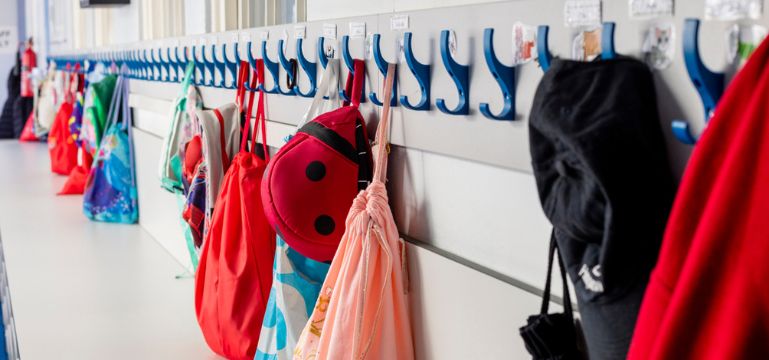Developing children’s independence by supporting their well-being

Quick links:
Information about the setting
Sychdyn Playgroup is registered to care for 19 children aged 2 ¼ months to 4 years. Playgroup sessions run five days a week from 9.00am-11.30am, and offers wrap around for nursery age children from 11.30am until 3:00pm. Sychdyn Playgroup operated in Sychdyn Village Memorial Hall for many years until September 2023 when it moved to a new build on the grounds of Sychdyn C.P School.
Context and background to the effective or innovative practice
The setting recognises the importance of children’s well-being on their ability to learn and focuses on supporting this in our setting. Practitioners want all children to be able to fulfil their learning potential and have worked hard to create a safe, warm, and welcoming environment in playgroup where children can make friends and learn successfully through play. Practitioners are consistent in their approach, respecting children and striving to build strong relationships with them. They aim to meet their emotional needs in a calm, kind and supportive way, encouraging children to develop self-regulation skills by guiding them sensitively to deal with their emotions. Practitioners believe that children’s well-being is supported by their ability to be independent as this gives them a feeling of control and develops their self-esteem and confidence.
Description of nature of strategy or activity
Environment:
Practitioners provide an environment that supports children’s ability to be independent. All resources are stored at child height and are readily accessible. Resources are well labelled, organised and developmentally appropriate. For most of the session, children are encouraged to choose from a wide range of provision areas and have free-flow access between the indoor and outdoor areas. Children recognise the different types of play they can engage in and use the areas purposefully.
Children:
- are encouraged to develop their independence in taking off their coats and putting them onto their own identifiable pegs
- bring their own snack in from home and choose when to access this during the ‘snack period’ window
- pour their own drinks and tidy away after themselves including putting rubbish in the recycling bin
- choose what to set out and play with in a provision area; for example, tables, floor spaces, sand and water trays are clear with resources being stored nearby
- use a wide range of open-ended resources and loose parts confidently and imaginatively in ways that are meaningful to them
- self-register on arrival
- wipe their own noses by using the ‘Tissue Station’
- independently access handwashing facilities within the room
- independently access the outdoor ‘wellie station’ where they are encouraged to remove their shoes and put on wellingtons
Adults:
Practitioners understand that it is important to encourage independent thinkers and learners and use a variety of strategies to achieve this.
They:
- have an expectation that children will tidy up as they go along and provide consistent reminders and support to enable children to learn to do this independently
- understand when to intervene and when to stand back to give children time to make their own independent choices and decisions
- support their oracy skills by modelling language and extending vocabulary
- make effective use of ‘I wonder’ questions whilst interacting with children to foster curiosity and motivate their independent exploration
- plan experiences within the local community such as visiting a shop, which involves children in decision making and accepting individual responsibility for elements of the experience
- support children’s ability to learn to assess risk independently, for example, considering whether to approach a particular hen during a visit to the school’s nature garden
What impact has this work had on provision and children’s standards?
In the setting nearly all children develop independence well above expectations and interact with each other and practitioners exceptionally well. Supporting children’s ability to be independent learners and thinkers has had a positive impact across all areas of development. The children have high levels of well-being. Fostering their independence has improved their self-esteem and confidence and this in turn helps them to develop resilience and perseverance to become lifelong learners.
How have you shared your good practice?
Staff from other settings have visited playgroup.
The setting’s good practice will be shared through a cluster group meeting with other funded non maintained nursery settings in the local authority.